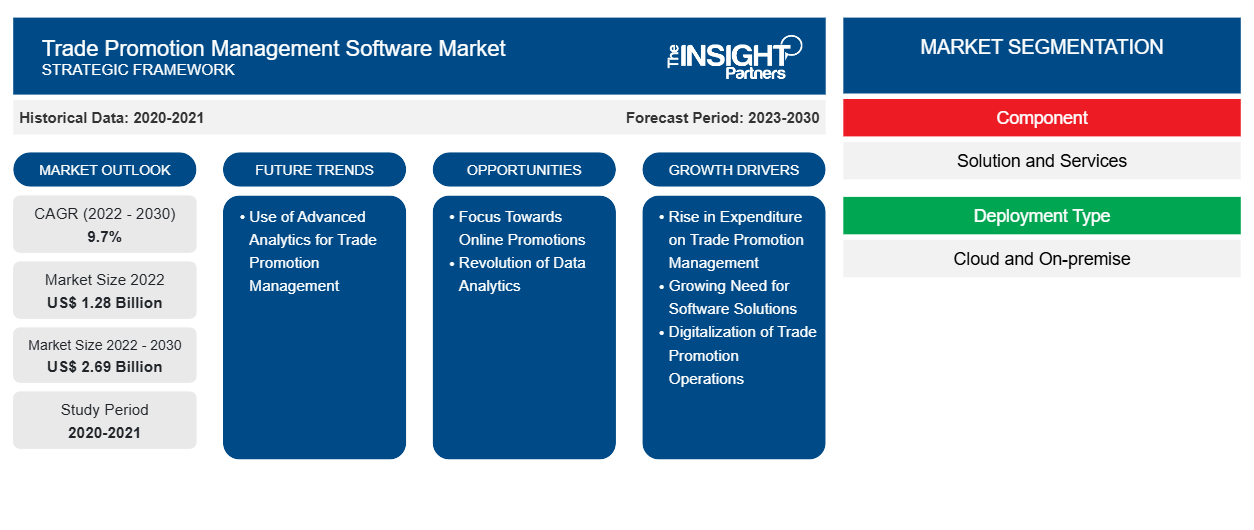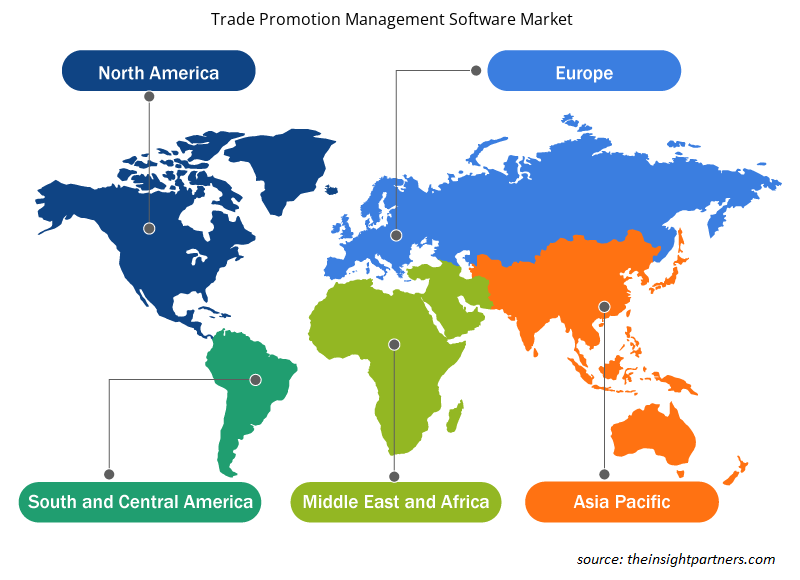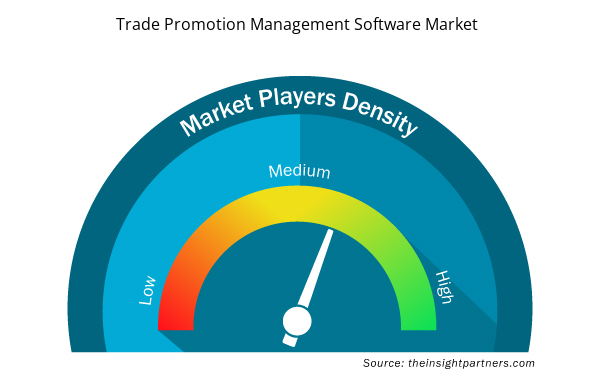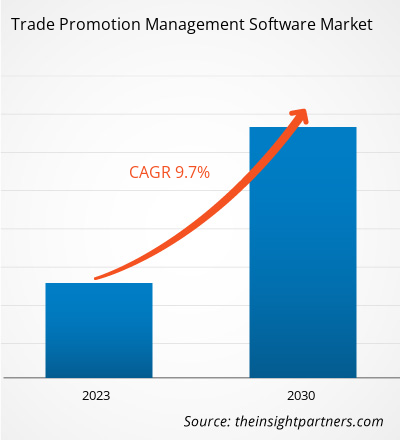[Research Report] The trade promotion management software market size was valued at US$ 1.28 billion in 2022 and is expected to reach US$ 2.69 billion by 2030. The trade promotion management software market is estimated to record a CAGR of 9.7% from 2022 to 2030.
Analyst Perspective:
The trade promotion management software market is a complex and ever-evolving ecosystem that encompasses a wide range of stakeholders, technologies, and solutions. At the core of this ecosystem are consumer goods (CG) companies, which use trade promotion management software to manage their trade promotions with retailers and wholesalers. These promotions can be offered as price discounts, coupons, displays, and advertising. The primary users of trade promotion management software, CG companies rely on these solutions to plan, execute, and track the effectiveness of their trade promotions. Retailers and wholesalers are essential partners in the trade promotion management process, as they play a crucial role in implementing and executing trade promotions at the point of sale. A diverse range of companies provide trade promotion management software solutions, catering to the specific needs of CG companies of all sizes and industries. CG companies are increasingly seeking trade promotion management solutions that can help them drive sales, improve margins, and achieve a competitive edge in the ever-expanding consumer goods industry.
Trade Promotion Management Software Market Overview:
Trade promotion management software is a tool used by organizations to strategize, plan, execute, and manage operations related to trade promotion campaigns. The objective of utilizing the trade promotion software is to increase revenue and maximize profits. The software is used by manufacturers, as well as retailers and vendors, for capitalizing on various strategies such as pricing strategies, product display, and offers & discounts.
The trade promotion management software market growth is attributed to the growing consumer goods industry due to the increase in global GDP per capita and the adaptation of modern lifestyles. Moreover, the increasing need to make data-driven decisions across various industry verticals by analyzing demand and supply forces for production and sales planning is among other factors bolstering the trade promotion management software market growth. However, the lack of adoption of trade promotion management software in certain developing and underdeveloped countries hampers the growth of the market. Moreover, the COVID-19 pandemic has marginally impacted the growth of the market.
Customize This Report To Suit Your Requirement
You will get customization on any report - free of charge - including parts of this report, or country-level analysis, Excel Data pack, as well as avail great offers and discounts for start-ups & universities
Trade Promotion Management Software Market: Strategic Insights

- Get Top Key Market Trends of this report.This FREE sample will include data analysis, ranging from market trends to estimates and forecasts.
You will get customization on any report - free of charge - including parts of this report, or country-level analysis, Excel Data pack, as well as avail great offers and discounts for start-ups & universities
Trade Promotion Management Software Market: Strategic Insights

- Get Top Key Market Trends of this report.This FREE sample will include data analysis, ranging from market trends to estimates and forecasts.
Trade Promotion Management Software Market Driver:
Digitalization of Trade Promotion Operations Drives Trade Promotion Management Software Market Growth
The digital transformation of trade promotion lays the groundwork for consumer packaged goods (CPG) companies to quickly adapt, boost revenues, and maintain the best profit margins. A successful digital trade promotion management strategy necessitates a deliberate, multifaceted, and data-driven approach. While businesses must manage trade promotion effectively within their organization, partnerships with retailers are important for long-term success. A mutually advantageous agreement between an FMCG company and a retailer fosters trust and growth for both companies. Coordination of several departments participating in trade promotion operations, such as revenue management, finance, and marketing, is also critical. To guarantee that the process is efficient and successful, there must be ownership and accountability, as well as incentives. Each trade promotion's lifecycle must be tracked. It is also necessary to visit physical stores to check that the planned promotional activities are carried out and to cross-reference the information with ePoS (electronic Point of Sale) data. Analytics applications are required to make use of both internal and external data. Automated and advanced statistical analysis tools can provide detailed insights into certain parts of trade promotion initiatives, assisting businesses in fine-tuning their approach. As a result of these digital tactics, the FMCG organization can continue to network with each client. Thus, the rise in digitalization of trade promotion operations boosts the trade promotion management software market growth.
Trade Promotion Management Software Market Report Segmentation and Scope:
Based on component, the trade promotion management software market is bifurcated into solution and services. Based on deployment type, the trade promotion management software market is divided into cloud and on-premise. In terms of application, the trade promotion management software market is bifurcated into large enterprises and small & medium size enterprises. Based on industry, the trade promotion management software market is categorized into retail & consumer goods, IT, pharmaceutical, manufacturing, and others. In terms of geography, the global trade promotion management software market is segmented into five major regions—North America, Europe, Asia Pacific (APAC), Middle East & Africa (MEA), and South America (SAM).
Trade Promotion Management Software Market Segmental Analysis:
Based on application, the trade promotion management software market is bifurcated into large enterprises and SMEs. The large enterprises segment held a larger trade promotion management software share in 2022, and the SMEs segment is expected to record a higher CAGR during the forecast period. Organizations with employee strength of more than 500 are categorized as large enterprises. Large enterprises have their clients across various geographical regions; and they account for significant market shares, technical capabilities, and effective business strategies. These large enterprises usually invest in the latest and innovative technologies to operate their business effectively. With the growing capabilities of trade promotion management software tools across various industries, the adoption of these tools has gained traction over the past few years. Large enterprises are utilizing various analytical tools, such as trade promotion management software, to streamline business operations effectively.
Trade Promotion Management Software Market Regional Analysis:
The North America trade promotion management software market size was valued at US$ 481.82 million in 2022 and is projected to reach US$ 938.07 million by 2030; it is expected to register a CAGR of 8.7% from 2022 to 2030. The North America trade promotion management software market is segmented into the US, Canada, and Mexico. The US accounted for the largest North America trade promotion management software market share in 2022.
The US, Canada, and Mexico are major economies in North America. Various retail operators in the region are making substantial investments in advanced technological solutions to generate higher returns on investment (ROI) compared to previous years. As consumers in the region, especially in the US, spend heavily on groceries, several retail startups are entering the market in North America. Also, retailers and technology companies are collaborating to invest significantly in promotional activities to attract new buyers and retain existing ones.
In North America, consumer goods companies are the major end users of trade promotion management solutions. The region consists of well-established consumer goods companies such as Coca-Cola, Nestle, PepsiCo., Procter & Gamble, Philip Morris, L'Oréal, and Kraft Foods Inc. Due to the presence of such leading consumer goods companies, the expenditure on promotional activities is rising. To remain competitive in the consumer goods sector, these companies continuously invest in advertising and other promotional activities to boost brand image and stimulate sales.
North America witnessed the footprints of companies offering trade promotion management solutions. For instance, Adesso, through its trade promotion management solutions, assists its customers in enhancing trade promotion management and effectiveness. The solution is efficient for small, mid-size, and emerging consumer packaged goods manufacturers in North America. Therefore, the footprints of trade promotion management solution providers and the growth of the consumer goods sector in North America are projected to create the demand for trade promotion management software to manage trade promotion activities efficiently and effectively.
Trade Promotion Management Software Market Key Player Analysis:
Aera Technology; TELUS; o9 Solutions, Inc.; Oracle; SAP SE; UpClear; Anaplan, Inc.; Aforza Inc.; Wipro; and Psignite Inc are among the key companies operating in the trade promotion management software market.
Trade Promotion Management Software Market Regional Insights
The regional trends and factors influencing the Trade Promotion Management Software Market throughout the forecast period have been thoroughly explained by the analysts at Insight Partners. This section also discusses Trade Promotion Management Software Market segments and geography across North America, Europe, Asia Pacific, Middle East and Africa, and South and Central America.

- Get the Regional Specific Data for Trade Promotion Management Software Market
Trade Promotion Management Software Market Report Scope
| Report Attribute | Details |
|---|---|
| Market size in 2022 | US$ 1.28 Billion |
| Market Size by 2030 | US$ 2.69 Billion |
| Global CAGR (2022 - 2030) | 9.7% |
| Historical Data | 2020-2021 |
| Forecast period | 2023-2030 |
| Segments Covered |
By Component
|
| Regions and Countries Covered | North America
|
| Market leaders and key company profiles |
Trade Promotion Management Software Market Players Density: Understanding Its Impact on Business Dynamics
The Trade Promotion Management Software Market is growing rapidly, driven by increasing end-user demand due to factors such as evolving consumer preferences, technological advancements, and greater awareness of the product's benefits. As demand rises, businesses are expanding their offerings, innovating to meet consumer needs, and capitalizing on emerging trends, which further fuels market growth.
Market players density refers to the distribution of firms or companies operating within a particular market or industry. It indicates how many competitors (market players) are present in a given market space relative to its size or total market value.
Major Companies operating in the Trade Promotion Management Software Market are:
- Wipro Ltd
- PSignite Group Inc
- Aera Technology
- TELUS
- o9 Solutions, Inc.
Disclaimer: The companies listed above are not ranked in any particular order.

- Get the Trade Promotion Management Software Market top key players overview
Trade Promotion Management Software Market Recent Developments:
Inorganic and organic strategies such as mergers and acquisitions are highly adopted by companies in the trade promotion management software market. A few recent key trade promotion management software market developments are listed below:
- In January 2023, Oracle announced a series of new cloud capabilities. Price Hub extends Oracle Retail Merchandising Cloud Services to automate the pricing process so retailers can easily make purchase price updates for a range of products to maximize sales and margins. New promotion capabilities in Oracle Retail Customer Engagement Cloud Services help retailers drive incremental revenue and profitability by executing more personalized and compelling offers. The cloud services are running on Oracle Cloud Infrastructure (OCI).
- In February 2022, SAP released feature pack 6 for SAP Trade Promotion Management, further extending SAP leadership in consumer products sales processes.
- In September 2020, TELUS worked with AFS Technologies and Exceedra to address a variety of business concerns. The company has always been committed to supporting clients' potential, from ensuring real-time access to information to optimizing the last steps to market to securing shelf space and instantly connecting with customers.
- Historical Analysis (2 Years), Base Year, Forecast (7 Years) with CAGR
- PEST and SWOT Analysis
- Market Size Value / Volume - Global, Regional, Country
- Industry and Competitive Landscape
- Excel Dataset



Report Coverage
Revenue forecast, Company Analysis, Industry landscape, Growth factors, and Trends

Segment Covered
Component, Deployment Type, Application, and Industry Vertical

Regional Scope
North America, Europe, Asia Pacific, Middle East & Africa, South & Central America

Country Scope
This text is related
to country scope.
Frequently Asked Questions
What is the estimated market size for the Global trade promotion management software market in 2022?
The Global trade promotion management software market was estimated to be US$ 1.28 billion in 2022 and is expected to grow at a CAGR of 9.7% % during the forecast period 2023 - 2030.
What are the driving factors impacting the Global trade promotion management software market?
Rise in Expenditure on Trade Promotion Management is one of the drivers for the market.
What are the future trends of the Global trade promotion management software market?
Use of Advanced Analytics for Trade Promotion Management is impacting positive impact, which is anticipated to play a significant role in the Global trade promotion management software market in the coming years.
What is the incremental growth of the Global trade promotion management software market during the forecast period?
The incremental growth expected to be recorded for the Global trade promotion management software market during the forecast period is US$ 1.40 billion.
Which are the key players holding the major market share of the Global trade promotion management software market?
The key players holding majority shares in the Global trade promotion management software market are Oracle, Anaplan, Inc., Aera Technology, SAP SE, TELUS.
What will be the market size of the Global trade promotion management software market by 2030?
The Global trade promotion management software market is expected to reach US$ 2.69 billion by 2030.
Trends and growth analysis reports related to Technology, Media and Telecommunications : READ MORE..
The List of Companies - Trade Promotion Management Software Market
- Wipro Ltd
- PSignite Group Inc
- Aera Technology
- TELUS
- o9 Solutions, Inc.
- Oracle Corp
- SAP SE
- UpClear
- Anaplan Inc
- Aforza Inc

 Get Free Sample For
Get Free Sample For